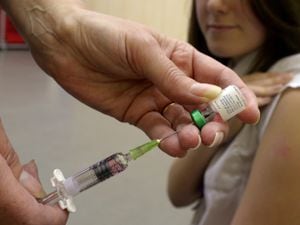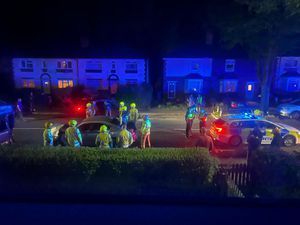National ‘call to action’ needed to prevent spread of measles – health chief
Vaccination rates have been dropping nationwide but there is particular concern about some regions.

A “national call to action” is needed across the country to ensure children are vaccinated against potentially deadly measles, the head of the UK Health Security Agency (UKHSA) has said.
Professor Dame Jenny Harries, chief executive of the UKHSA, warned that measles is spreading among unvaccinated communities, and urged parents to check whether their children have had the measles, mumps and rubella (MMR) jab.
Vaccination rates across the country have been dropping, but there are particular concerns about some regions, including parts of London and the West Midlands.
Figures released by the UKHSA show there have been 216 confirmed measles cases and 103 probable cases in the West Midlands since October 1 last year.
Four-fifths (80%) have been found in Birmingham while 10% were identified in Coventry, with the majority being in children aged under 10.
The UKHSA has declared a national incident, which it said is an internal mechanism signalling the growing public health risk and enabling it to focus work in specific areas.
Ahead of her visit to Birmingham on Friday, Dame Jenny told BBC Radio 4’s Today programme that people have “forgotten what measles is like”, and that children can be unwell for a week or two with symptoms including a nasty rash, high fever and ear infections. She added that the virus is highly infectious.

There can also be serious complications, hospital admissions and death.
“The focus this morning obviously is on the West Midlands and I’m going there, but I think the real issue is we need a call to action right across the country,” she said.
“We had established measles elimination status in the UK, but in fact our vaccination rates now have dropped on average to about only 85% of children arriving at school having had the two MMR doses.
“In the West Midlands, that’s in some areas down to 81%, (and) if we go down to the Surrey Heartlands Integrated Care Board area, that’s just over 70%.
“So we are well under the recommended coverage for MMR vaccination that the WHO (World Health Organisation) recommends.”
She said uptake of MMR vaccines does differ among communities.
Asked which communities, she said: “This is an important point, I think, for the West Midlands, for those in Muslim communities, they will be not keen to take up one of the MMR vaccines that we offer which has a pork-based derivative.
“But it’s really important that they’re aware there is a non-porcine vaccine which is available to them and very effective.
“So it’s that sort of understanding and ensuring that knowledge is available to people so they can make choices.”
She said the vaccine programme in the UK is “clearly not” where the UKHSA wants it to be, adding “we want it to be 95% (coverage)”.
She added: “It’s quite common with vaccination programmes that when the risk is perceived to have gone away, then the concern to get vaccinated may drop off and so one of the reasons for flagging this today is to remind people that cases are still out there. This is a serious illness.”
The UKHSA carried out a specific risk assessment last July in London because up to 20% of children were entering school unvaccinated.
Dame Jenny said this was a “significant risk” to the population in London.
“Thankfully, many families have come forward and children have been vaccinated, but the rates remain low,” she added.
“Now… predictably, we’re seeing that swing move to other, particularly inner city areas, where we know vaccination rates are low.
“This is a call right across the country for all parents to check the vaccination rates of their children and also, one of our most unvaccinated populations are young adults (born around 1998 to 2004)… and many of those now, of course, will be in frontline work, so things like young teachers, and it’s really important that they also get vaccinated with MMR.”
Official figures show uptake of the vaccine is at its lowest point in over a decade.
In 2022/23, some 84.5% of youngsters in England had received both doses of the jab by the time they were five years old – the lowest level since 2010/11. Some 92.5% had received one dose.
It comes as NHS England issued, for the first time, infection control guidance on measles to the NHS.
Most of it is standard procedure for infectious diseases, such as ensuring communication between GP surgeries and hospitals if a patient has measles and is being admitted for care.
If a person needs to see a GP, they should be isolated at the time of arrival (for example, directed to a side room) and appointments should be scheduled to reduce waiting times in reception areas to avoid spreading the disease, the guidance said.
In hospitals, patients with suspected measles should also be put in a separate area (ideally a single room away from others) as soon as possible.
Those inpatients with suspected or confirmed measles should, whenever possible, be placed in an infectious disease isolation room with en-suite facilities, it added.
The guidance also said hospitals can assign a dedicated team of care staff to care for patients in isolation or group rooms and areas.
“This can only be implemented if there are sufficient levels of staff available (so as not to have a negative impact on non-affected patients’ care),” it said.
“Only staff whose vaccination status, disease history or immune status is known should be assigned to isolation or cohort rooms and areas.”
Helen Bedford, professor of children’s health at UCL Great Ormond Street Institute of Child Health, added: “Measles is a potentially very serious infection.
“About one in 1,000 people with measles develop inflammation of the brain and even in high-income countries like the UK, about one in 5,000 die from the infection.
“Apart from managing the symptoms of measles, there is no treatment.
“There is no upper age limit for vaccination so if you or your loved ones have missed out, now is the time to get that protection. We can stop this infection in its tracks with vaccination.”





